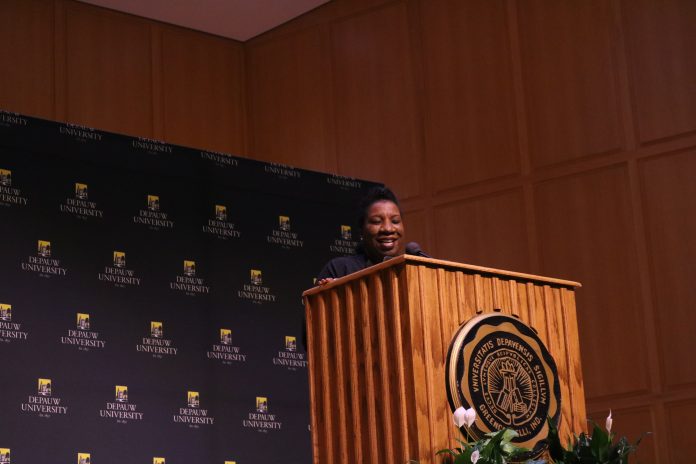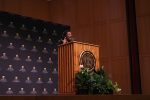
Tarana Burke, founder of the ‘me too’ movement was met with a a packed Kresge auditorium and thunderous applause when she stepped on stage on Thursday.
Burke was at DePauw as part of the Delta Gamma Foundation’s Dorothy Martin Lecture Series along with the support from the Women's Center and the Prindle Institute for Ethics.
She talked about the movement she founded in 2006 to create a place of healing for women of color who have survived sexual violence. The movement has grown since then and Burke emphasized that the movement is not only for women, but for all marginalized groups.
“We are committed to centering survivors, especially survivors of color, and the most marginalized amongst us including queer, trans and disabled folks,” said Burke.
The 2017 TIME person of the year spoke about the way Maya Angelou’s stories of sexual violence helped her cope with her own experiences. After she first heard Angelou recite “Phenomenal Woman,” Burke asked herself, “How can a person that holds so much pain, also hold joy?”
She looked to her community for a conversation about sexual violence, and discovered nobody in her surrounding community was talking about it.
She said that the movement started with the purpose of filling a void. When a 13 year old girl, who she calls Heaven, came forward about her own experience with sexual violence Burke was inspired to develop resources for survivors.
When Heaven came to her, Burke felt unprepared to handle her trauma because she was still coming to terms with her own.
“It started with not being able to find the resources that we needed, and then realizing that we were the resources,” Burke said. “And we turned our own stories and our own survival tactics into work.”
In 2007, Burke started a Myspace page to create a community for survivors to share their experiences.“They needed someone to say to them healing was possible,” Burke said.
It’s been over 10 years since Burke started the ‘me too’ movement, and since then it has gone viral and sparked a national conversation about sexual violence.
However, Burke emphasized the importance of not getting caught up in the sensationalism of the media’s coverage of the #MeToo movement.
The hashtag, which is different from Burke’s movement, became viral last Oct. when Alissa Milano asked sexual assault survivors to write ‘me too’ in response to her tweet.
Burke said she wasn’t shocked at the number of people who responded with ‘me too’ because she knows how pervasive sexual violence is. She said she worries that “we are going to squander this unique historical movement if we don't shift the way we are talking and thinking about it.”
Apart from giving insight into the founding of her movement, Burke also challenged how conversations about sexual assault took place last semester at DePauw.
After reciting the University’s mission statement, Burke described DePauw administration’s response last semester to a map, which tracked sexual assaults on campus from April 2013 to Feb. 2018 as a “missed opportunity” for conversation.
The map was collected by "a group of womxn at DePauw" through an anonymous survey, which had 82 participants within three months, according to an Instagram post by Feminista!. There are 25 different locations on the map and a total of 95 different alleged sexual assaults.
Along with the map, there were sheet signs that said “Rapists exist at DePauw” put up in the locations where these alleged sexual assaults occurred, including buildings such as Roy O. West library and the Union Building.
The administration responded with an email sent by Myrna Hernandez, the dean of students and Dorian Shager, the dean of campus life oversight for campus activities. The email sent on May 10 stated they would take down the signs because of the Campus Publicity and Display Policy and under the concern of triggering other students.
Burke encouraged students to speak up and use their power to act and “figure out what phase two looks like.”
Students were inspired by Burke’s words, including senior Josh Selke who said her talk was much needed on campus. “Her words are both inspiring and act provoking and should be a message that shifts conversations on sexual assault, sexual harassment and rape culture on college campuses everywhere,” they said.
Other students, such as first-year Chloe Johnson appreciated how Burke emphasized the importance of figuring out how people can make a change collectively in a community. “I really liked the fact that she was informing (people) about all areas because she spoke on being a black woman and that perspective of sexual assault,” she said, “but she made sure she touched on every person's story.”
Throughout her speech, Burke reminded students of their power. “You deserve to feel safe and there should be an inherent commitment to making this community less vulnerable to sexual violence.”
Burke left the room on their feet, clapping with her last two words resonating: ‘me too.’



